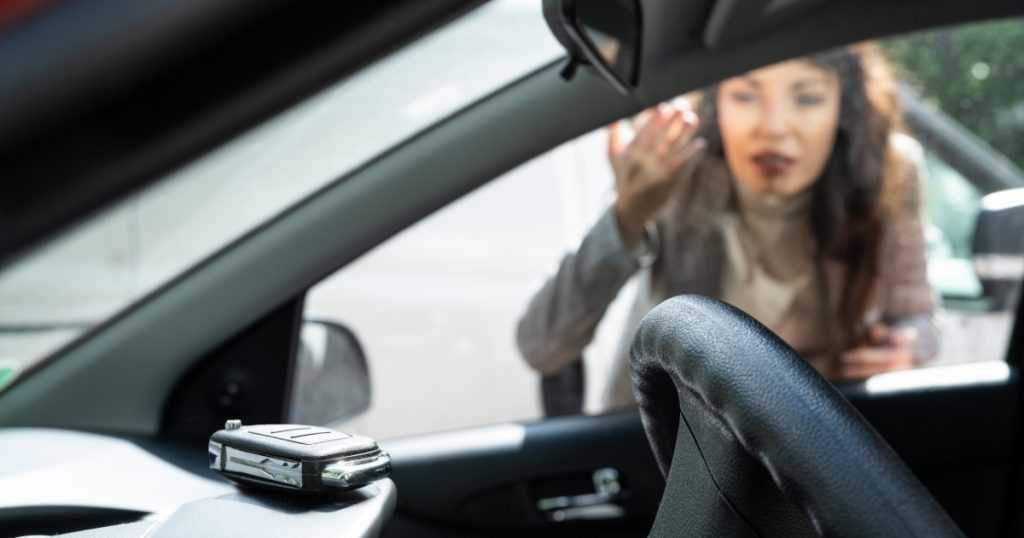A car lockout is an unfortunate and inconvenient situation that many people face at some point in their lives. It occurs when you’re locked out of your vehicle, unable to gain access. This can happen for various reasons, such as losing your keys, locking them inside the car, or experiencing a malfunction with the locking mechanism.
Fortunately, there are several methods to regain access to your vehicle during a car lockout. In this comprehensive guide, we will explore various techniques and precautions to help you overcome a car lockout. By following these tips and suggestions, you can safely and efficiently regain access to your car and be on your way.
Why Do Car Lockouts Happen?
Losing Your Keys
One of the most common reasons for a car lockout is simply misplacing or losing your car keys. This can happen to anyone, and it’s often a result of being in a rush or not paying attention to where you placed them. In such cases, retracing your steps may help you locate your keys, but if they are truly lost, you’ll need to consider alternative solutions to regain access to your car.
Locking Keys Inside the Car
Another common cause of car lockouts is accidentally locking your keys inside your vehicle. This can happen when you exit the car and accidentally leave the keys on the seat, dashboard, or in the ignition. A momentary lapse in attention can lead to this frustrating situation.
Key or Lock Malfunctions
Sometimes, a car lockout can be caused by a malfunction in your car key or the lock itself. This may include issues such as a broken or bent key, a jammed lock, or a dead battery in a key fob. In these cases, it’s essential to address the underlying issue to prevent further lockouts.
Preventative Measures to Avoid Car Lockouts
- Make Spare Keys
One of the best ways to prevent car lockouts is to have a spare set of keys. This way, if you lose your primary set or lock them inside your car, you can use the spare to gain access. It’s a good idea to store the spare keys in a safe and accessible location, such as at home or with a trusted friend or family member.
- Develop a Key-Placement Routine
Another effective preventative measure is to establish a consistent routine for placing your keys when you’re not using them. This can help reduce the likelihood of losing them or leaving them inside your car. For example, you might designate a specific hook or bowl near your front door for your keys, or always place them in the same pocket or compartment in your bag.
- Regularly Check and Maintain Your Locks and Keys
Regular maintenance of your car’s locks and keys can help prevent malfunctions that could lead to a lockout. This includes cleaning and lubricating your locks, checking for wear and tear, and replacing worn or damaged keys. Additionally, ensure that the battery in your key fob is functioning correctly and replace it when necessary.
- Invest in a Key Finder
If you’re prone to misplacing your keys, a key finder can be a worthwhile investment. These devices use Bluetooth technology to connect to your smartphone, allowing you to track the location of your keys. Some key finders even feature a built-in alarm, which can be activated through an app on your phone, helping you locate your keys more easily.
Assessing the Situation
- Determine the Cause of the Lockout
Before attempting to unlock your car, it’s crucial to determine the cause of the lockout. This will help you identify the most appropriate course of action, whether it’s locating your spare key, calling a locksmith, or attempting a DIY method.
- Assess the Risks and Consequences
When considering your options, be sure to weigh the potential risks and consequences. While some DIY methods may be tempting, they can cause damage to your vehicle or compromise its security. Additionally, attempting to unlock your car without the proper tools or knowledge can lead to injury.
DIY Methods for Unlocking Your Car
Using a Shoelace or String
For vehicles with pull-up locks, a shoelace or string can be used as an improvised tool to unlock the door. Create a slipknot in the middle of the string, slide it through the door jamb, loop it around the lock, and pull upwards to lift the lock. However, be aware that this method may not work on newer vehicles with more advanced locking systems.
Using a Coat Hanger
A coat hanger can be used to unlock some cars by manipulating the lock mechanism through the window gap or door jamb. Straighten the hanger, create a small hook at one end, and carefully insert it into the gap to reach the lock mechanism. This method requires patience and skill and may not be suitable for all vehicles.
Using a Wedge and a Long Rod
A small inflatable wedge and a long rod can be used to create a gap between the door and the car body, allowing you to access the lock or interior door handle. Inflate the wedge carefully to avoid damaging your car, and use the rod to manipulate the lock or handle. Be cautious, as this method can potentially damage your vehicle’s weatherstripping and paint.
Disclaimer: DIY Methods and Risks
While these DIY methods can be effective in some cases, they come with inherent risks. Damage to your car, voided warranties, or even injury are possible outcomes. If you’re not confident in your abilities or the risks outweigh the benefits, it’s best to contact a professional locksmith.
When to Call a Professional Locksmith
When DIY Methods Fail or Are Too Risky
If you’ve attempted DIY methods without success or feel that they’re too risky, it’s time to call an auto locksmith. A locksmith has the necessary tools and expertise to unlock your car without causing damage or compromising its security.
In Cases of Key or Lock Malfunctions
When a lockout is caused by a malfunction in the lock or key, a local locksmith is often the best solution. They can diagnose and repair the issue, ensuring that you regain access to your car and prevent future lockouts caused by the same problem.
When You Don’t Have a Spare Key
If you don’t have a spare key and are unable to locate your primary set, a locksmith can help by creating a new key for your vehicle. This may involve cutting a new key or programming a new key fob, depending on your car’s make and model.
Choosing a Trustworthy Locksmith
- Research and Compare Local Locksmiths
Take the time to research and compare local locksmiths before deciding on one. Look for reviews and recommendations from friends, family, or online sources. Consider factors such as experience, reputation, and pricing when making your decision.
- Verify Licensing and Insurance
Before hiring a locksmith, ensure that they are licensed and insured. This provides protection and peace of mind, knowing that you’re working with a professional who meets industry standards and carries insurance to cover any potential damages.
- Ask for an Estimate
Before agreeing to any services, request an estimate for the cost of unlocking your car. A reputable locksmith should be able to provide a reasonably accurate quote based on your situation. Be wary of locksmiths who are unwilling to provide an estimate or who quote suspiciously low prices, as they may be attempting to scam you.
The Locksmith’s Unlocking Process
- Assessing the Situation and Choosing the Right Tools
Upon arrival, a professional locksmith will assess the situation to determine the best approach for unlocking your car. They will select the appropriate tools and techniques based on your car’s make, model, and the specific locking mechanism.
- Unlocking the Car Safely and Efficiently
A locksmith will use their expertise and specialized tools to unlock your car without causing damage or compromising its security. This may involve picking the lock, manipulating the lock mechanism, or using air wedges and long reach tools to access the interior door handle or lock.
- Key Replacement or Reprogramming
If your car lockout is caused by a lost or malfunctioning key, the locksmith may need to create a new key or reprogram a key fob. This process will vary depending on your vehicle’s specific requirements, but a skilled locksmith should be able to complete the task efficiently.
Insurance Coverage for Car Lockouts
- Check Your Insurance Policy
Some car insurance policies include coverage for lockout services. Review your policy or contact your insurance provider to determine if your policy covers locksmith services in the event of a lockout. If it does, you may be eligible for reimbursement or direct payment for the cost of a locksmith.
- Roadside Assistance Programs
Many insurance providers and automobile clubs offer roadside assistance programs that include lockout services. If you have a membership in such a program, contact the provider for assistance during a car lockout. They will typically dispatch a locksmith to help you regain access to your vehicle.
Frequently Asked Questions
How much does it cost to unlock a car by a locksmith?
The cost of unlocking a car by a locksmith can vary depending on factors such as the time of day, your location, and the complexity of your car’s locking system. On average, you can expect to pay between £50 and £150 for professional lockout services.
Can a locksmith make a new car key on the spot?
In many cases, a locksmith can create a new car key on the spot. This will depend on the make and model of your vehicle, as well as the locksmith’s available tools and expertise. For some vehicles, a new key may need to be ordered from the dealership or a specialist key cutting service.
Can I unlock my car using my phone?
Some modern vehicles with advanced locking systems offer the ability to unlock your car using a smartphone app. This feature typically requires a specific app provided by the manufacturer, and your vehicle must be equipped with the necessary hardware and software. If your car has this capability, consult your owner’s manual or contact the manufacturer for more information on how to use it.
How long does it take for a locksmith to unlock a car?
The time it takes for a locksmith to unlock a car can vary based on factors such as the complexity of the lock, the tools required, and the locksmith’s experience. On average, a skilled locksmith can unlock a car in approximately 5 to 15 minutes.
Conclusion
A car lockout can be a frustrating and inconvenient experience, but with the right knowledge and strategies, it’s possible to overcome the situation and regain access to your vehicle. Whether you choose to attempt a DIY method or call a professional locksmith, it’s crucial to assess the risks and consequences to ensure a safe and successful outcome.
By implementing preventative measures, such as making spare keys and maintaining your locks, you can reduce the likelihood of experiencing a car lockout. And, in the event of a lockout, knowing when to call a professional locksmith and how to choose a trustworthy one can help you resolve the situation quickly and efficiently.

